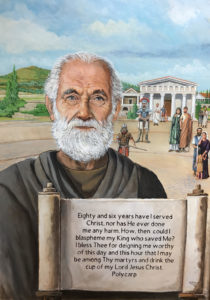Polycarp was a presbyter, a Greek word meaning “old man,” from which we get the word “priest.” He is kind a patron saint of old men because, unlike almost all of the first-generation disciples who died young (as martyrs), Polycarp died old. Second-generation disciples lived during a time of relative calm for the Church. It wasn’t until his 86th year that persecutions ramped up, and that Polycarp’s faith and the Roman government came into an impassable conflict.
In the end, why did this kindly old man have to be executed? The epistle for today’s Mass is from 1 John 3:10-16, words that Polycarp (as a student of John) probably heard John himself speak. “Do not be like Cain, who killed his brother,” John writes. And why did Cain slay his own brother? Simply, John says, because Cain’s works were wicked, and his brother’s works were just. Those who worship false gods cannot tolerate those who worship the true God. Christians in a pagan world must expect martyrdom. As they tie us to the pyre, however, God will give us the grace to speak kindly to those who kill us. Martyrdom means “witness” in Greek, and what martyrs witness to above all is the love of Christ, pouring with his blood from the Cross upon those who crucified Him.
I am a presbyter, but most of my priesthood has been in a time of relative calm for the Church. I’ve long had the premonition that I will die, or at least face jail time, for the Catholic faith. But here I am, in my 61st year, and still alive. If I die for the faith, along with other priests and bishops of my generation, it will be as an old man. How much easier it is to let go of this world as an old man! With Qoheleth, I say “Vanity of vanities. All is vanity.” How silly it is, on the other hand, for old people to cling to the things of this world as our physical powers wane, as our memory, our friends and our influence become negligible. As we grow old, and as the culture grows increasingly intolerant of Christians, the older generation must keep our eyes and hearts on Christ, on the life of the world to come. Thus we will leave this world with a peaceful mien and kindly disposition, commending ourselves, and all our lives, and all our fellow travelers in this world, to God’s loving mercy.



 RSS Feed
RSS Feed